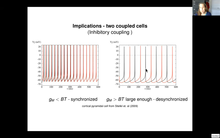The videos from Brain Day 2023 are now available on line at our youtube channel. Hope you enjoy.
Date: Tues., Dec. 12, 2006
Time: 3:00 p.m.
Location: Hagey Hall (HH), room 178
Speaker: Jean Rouat, (McMaster University visiting professor, Sherbrooke University)
Title: Towards Neurocomputational Models of Speech and Sound Processing
Abstract: From physiology we learn that the auditory system extracts simultaneous features from the underlying signal, giving birth to simultaneous representations of audible signals. We also learn that pattern analysis and recognition are not separated processes (in opposition to the engineering approach of pattern recognition where analysis and recognition are usually separated processes). Also, in the visual system, it has been observed that the sequence order of firing is crucial to perform fast visual recognition tasks (Rank Order Coding).
The use of the Rank Order Coding has also been recently hypothesized in the mammalian auditory system. Dr. Rouat will present exploratory and potential solutions to applications in speech processing with networks of spiking neurones. In one application he will present a very simplistic speech recognition prototype that uses the Rank Order Coding scheme and will discuss its performance in comparison with a conventional Hidden Markov Model speech recognizer.
In another application, he will explain how to combine an auditory images representation with a network of oscillatory spiking neurones to segregate and bind auditory objects for acoustical source separation. It is shown that the spiking neural network performs unsupervised auditory images segmentation (to find 'auditory' objects) and binding of the objects belonging to the same auditory source (yielding automatic sound source separation). Dr. Rouat will also briefly comment on the use of the Oscillatory Dynamic Link Matcher for applications in image processing.
More about the speaker:
Jean Rouat is McMaster Univ. visiting prof. and Sherbrooke Univ. prof. He holds a master degree in physics from Univ. de Bretagne, France (1981), an E. & E. master degree in speech coding and speech recognition from Université de Sherbrooke (1984) and an E. & E. Ph.D. in cognitive and statistical speech recognition jointly with Université de Sherbrooke and McGill University (1988). From 1988 to 2001 he was with Université du Québec à Chicoutimi (UQAC). In 1995 and 1996, he was on a sabbatical leave with the Medical Research Council, Applied Psychological Unit, Cambridge, UK and the Institute of Physiology, Lausanne, Switzerland. In 1990 he founded the ERMETIS, Microelectronics and Signal Processing Research Group from UQAC. He is now with Université de Sherbrooke where he founded the Computational Neuroscience and Intelligent Signal Processing Research group. He regularly acts as a reviewer for speech, neural networks and signal processing journals. He is an active member of scientific associations (Acoustical Society of America, Int. Speech Communication, Institute of Electrical and Electronics Engineers (IEEE), Int. Neural Networks Society, Association for Research in Otolaryngology, etc.). He is a senior member of the IEEE and was on the IEEE technical committee on Machine Learning for Signal Processing from 2001 to 2005.
Date: Wed., Mar. 28, 2007
Time: 3:30 p.m.
Location: HH 334
Speaker: Dr. Mandar Jog, Associate Professor, University of Western Ontario, (Director, Movement Disorders Program, London Health Sciences Centre LHSC)
Title: Information Entropy and the Tipping Point of Neuronal Networks
Abstract: Despite significant advances in the understanding of neurochemical and neuroanatomical connectivity of the brain in the healthy and disease states, we are still no farther ahead in the understanding of how the flow of information may be occurring within the system. Information theory has been applied to this system and again, in isolation has not taken the field very far. We have used a theoretical framework that has attempted to combine thermodynamic and information entropy and applied it to actual neurophysiological data from chronic multichannel recordings from rodent basal ganglia. We have found interesting and non-obvious results that extend the understanding of the learning process within the basal ganglia at a very subtle, temporo-spatial level.







